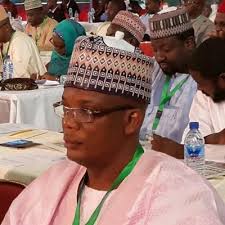The Supreme Court has affirmed the five-year jail term handed down to the former House of Representatives member, Farouk Lawan by the Court of Appeal in Abuja for receiving a bribe of $500,000 from businessman Femi Otedola.
He had approached the Supreme Court to appeal seeking the Apex Court to set aside the February 24, 2022 judgment of the Appeal Court in Abuja, which sentenced him to a five-year jail term and discharged him on two out of the three counts on the corruption charge brought against him by the Federal Government.
In the lead judgment prepared by Justice John Okoro but read by Justice Tijjani Abubakar, the apex court held that Lawan’s appeal was without merit and thereby it was dismissed.

The five-member panel unanimously upheld the 2022 judgment of the Court of Appeal which that also affirmed Lawan’s sentencing to five years in respect of only count three on the three-count charge on which he was tried at the High Court of the Federal Capital Territory.
Lawan was convicted and sentenced to prison in 2021 for accepting $500,000 bribe from businessman, Femi Otedola, Chairman, Zenon Petroleum and Gas Limited.
A three-member Appeal Court panel led by its president, Monica Dongban-Mensem, had unanimously overturned the former lawmaker’s conviction for two of the three offences he was earlier jailed for by the lower trial court in June 2021.
After his appealed against his conviction and sentencing by the lower High Court of the Federal Capital Territory (FCT), Abuja, Lawal also got a reduction of his jail term by the appellate court from seven to five years.
This was as a result of his acquittal in respect of two counts for which each attracted seven years jail term at the trial court.
Lawan was left with a conviction for the third offence with five years’ imprisonment as punishment by the Court of Appeal’s overall decision.
During the hearing of appeal at the Supreme Court, Lawan’s Counsel and Senior Advocate of Nigeria, Joseph Daudu, had asked the court to allow his client’s appeal and set aside the judgment of the Court of Appeal.
While outlinning, Daudu noted that the Court of Appeal discharged on counts one and two, which attracted a maximum of seven years.
Daudu argued that if the Court of Appeal could discharge his client on the two counts, which he claimed, have the same ingredients as the third count, the Supreme Court should equally let off the hook in relation to the third count.
Counsel to the Federal Government, Bagudu Sanni, urged the court to affirm the judgment of the Court of Appeal and dismiss the appeal




